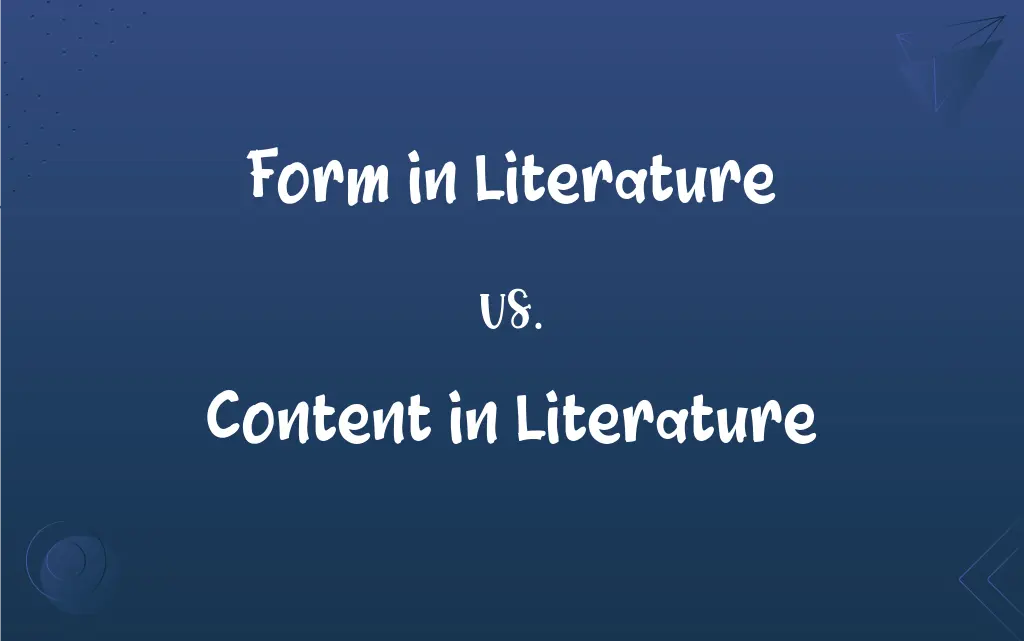Form in Literature vs. Content in Literature: What's the Difference?
Edited by Aimie Carlson || By Janet White || Published on March 23, 2024
Form in literature refers to the structure, style, and organization of a literary work, while content refers to the themes, ideas, and subject matter conveyed by the work.

Key Differences
Form in literature encompasses the various elements that shape the structure of a literary work, such as genre, narrative style, and poetic meter. Content in literature, on the other hand, refers to the themes, messages, and ideas that the work explores and communicates.
Form and content are distinct aspects of literature, they are closely interrelated. The form of a literary work can influence and enhance its content, and the content can dictate the most appropriate form for its expression.
The form of a literary work serves to organize and present its content in a coherent and impactful manner. Content, however, is the substance of the work, conveying its meaning and purpose.
Form can vary widely across different literary works, with each genre and style having its own conventions. Content can also vary, reflecting the diverse range of human experiences, emotions, and ideas explored in literature.
An example of form might be the sonnet structure in poetry, characterized by its specific rhyme scheme and meter. An example of content might be the exploration of love and loss in a novel or poem.
ADVERTISEMENT
Comparison Chart
Definition
Structure, style, organization
Themes, ideas, subject matter
Interrelation
Influences and enhances content
Dictates appropriate form
Function
Organizes and presents content
Conveys meaning and purpose
Variability
Varies by genre and style
Reflects diverse human experiences
Examples
Sonnet structure, narrative style
Exploration of love, social issues
ADVERTISEMENT
Form in Literature and Content in Literature Definitions
Form in Literature
The manner in which a story is told.
The form of the narrative is characterized by its use of stream-of-consciousness.
Content in Literature
The sequence of events in a narrative.
The content of the play includes a complex plot with twists and turns.
Form in Literature
Techniques used to enhance expression.
The form of the poem is enriched by the use of metaphors and alliteration.
Content in Literature
The central ideas or messages.
The content of the novel revolves around themes of identity and belonging.
Form in Literature
The organization of a literary work.
The novel's form consists of alternating chapters from different characters' perspectives.
Content in Literature
The portrayal and growth of characters.
The content of the story is driven by the protagonist's journey.
Form in Literature
The rhythmic pattern in poetry.
The sonnet's form is defined by its iambic pentameter.
Content in Literature
The feelings evoked by the literature.
The content of the poem elicits a sense of nostalgia and longing.
Form in Literature
A category of literature with specific conventions.
The form of a mystery novel includes clues and a detective character.
Content in Literature
The topics explored in a literary work.
The content of the essay focuses on environmental conservation.
FAQs
Why is the form important in literature?
The form is important in literature because it provides a framework for organizing and presenting the content in a coherent and impactful manner.
How do form and content interact in literature?
Form and content interact in literature by the form shaping how the content is presented and the content influencing the choice of form.
What is content in literature?
Content in literature refers to the themes, ideas, and subject matter conveyed by the work.
How does the form of poetry differ from that of prose?
The form of poetry often includes elements like meter, rhyme, and stanza structure, while the form of prose is characterized by sentence and paragraph structure without a fixed rhythmic pattern.
Are form and content equally important in literature?
Form and content are both important in literature, as they work together to create a meaningful and effective literary work.
What is form in literature?
Form in literature refers to the structure, style, and organization of a literary work.
How can content in literature reflect societal issues?
Content in literature can reflect societal issues by exploring themes and subject matter that are relevant to the social, political, and cultural contexts of the time.
How do authors choose the form for their literary works?
Authors choose the form for their literary works based on factors such as the genre, the themes they want to explore, and the most effective way to convey their message.
Can the form of a literary work change its content?
The form of a literary work can influence how the content is perceived and interpreted, but it does not change the content itself.
Can a literary work have good form but weak content?
Yes, a literary work can have good form but weak content if it is well-structured and stylistically impressive but lacks depth or significance in its themes and ideas.
Can the content of a literary work be universal?
Yes, the content of a literary work can be universal if it explores themes and experiences that are relatable across different cultures and time periods.
Can the form of a literary work be experimental?
Yes, the form of a literary work can be experimental, with authors often pushing the boundaries of traditional structures and styles to create innovative and unique works.
Can the content of a literary work be open to interpretation?
Yes, the content of a literary work can be open to interpretation, with different readers finding varied meanings and insights based on their perspectives and experiences.
How does the form of a novel contribute to its storytelling?
The form of a novel, including its chapter structure, narrative perspective, and pacing, contributes to its storytelling by shaping how the story unfolds and is experienced by the reader.
What is the impact of digital media on the form of literature?
Digital media has impacted the form of literature by introducing new formats like e-books, interactive storytelling, and multimedia elements that expand the ways literature can be presented and experienced.
How do historical and cultural contexts influence the form and content of literature?
Historical and cultural contexts influence the form and content of literature by shaping the themes, styles, and conventions that are relevant and resonant for the time and place in which the work is created.
What is the relationship between form and genre in literature?
The relationship between form and genre in literature is that genre often dictates certain expectations and conventions for the form, such as the structure of a sonnet in poetry or the narrative elements of a mystery novel.
Can content in literature be purely factual?
Content in literature can include factual information, but it is often presented in a creative or interpretive manner, making it different from purely factual writing.
What role does content play in character development in literature?
Content plays a crucial role in character development in literature by providing the context, motivations, and experiences that shape the characters' personalities and growth.
How does content in literature evoke emotions in readers?
Content in literature evokes emotions in readers by engaging with their feelings, experiences, and empathetic responses to the characters and situations depicted.
About Author
Written by
Janet WhiteJanet White has been an esteemed writer and blogger for Difference Wiki. Holding a Master's degree in Science and Medical Journalism from the prestigious Boston University, she has consistently demonstrated her expertise and passion for her field. When she's not immersed in her work, Janet relishes her time exercising, delving into a good book, and cherishing moments with friends and family.
Edited by
Aimie CarlsonAimie Carlson, holding a master's degree in English literature, is a fervent English language enthusiast. She lends her writing talents to Difference Wiki, a prominent website that specializes in comparisons, offering readers insightful analyses that both captivate and inform.
































































